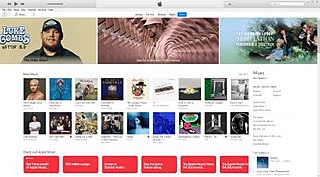
PayPal Holdings, Inc. is an American multinational financial technology company operating an online payments system in the majority of countries that support online money transfers; it serves as an electronic alternative to traditional paper methods such as checks and money orders. The company operates as a payment processor for online vendors, auction sites and many other commercial users, for which it charges a fee.

The iTunes Store is a digital media store operated by Apple Inc. which opened on April 28, 2003. As of April 2020, iTunes offered 60 million songs, 2.2 million apps, 25,000 TV shows, and 65,000 films. The iTunes Store is available on most home and portable Apple devices, as well as some platforms by other companies. The store opened as part of then-CEO Steve Jobs' push to open a digital marketplace for music; when it opened, it was the only legal digital catalog of music to offer songs from all five major record labels, which played a part in its success and influence in the music downloading business. While initially a dominant player in digital media, by the mid-2010s, streaming media services were generating more revenue than the buy-to-own model used by the iTunes Store; Apple now operates its own subscription-based streaming music service, Apple Music, alongside the iTunes Store.
A micropayment is a financial transaction involving a very small sum of money and usually one that occurs online. A number of micropayment systems were proposed and developed in the mid-to-late 1990s, all of which were ultimately unsuccessful. A second generation of micropayment systems emerged in the 2010s.

eMusic is an online music and audiobook store that operates by subscription. In exchange for a monthly subscription eMusic users can download a fixed number of MP3 tracks per month. eMusic was established in 1998, is headquartered in New York City with an office in London, and is owned by TriPlay.

Online shopping is a form of electronic commerce which allows consumers to directly buy goods or services from a seller over the Internet using a web browser or a mobile app. Consumers find a product of interest by visiting the website of the retailer directly or by searching among alternative vendors using a shopping search engine, which displays the same product's availability and pricing at different e-retailers. As of 2020, customers can shop online using a range of different computers and devices, including desktop computers, laptops, tablet computers and smartphones.
Digital distribution, also referred to as content delivery, online distribution, or electronic software distribution, among others, is the delivery or distribution of digital media content such as audio, video, e-books, video games, and other software.

Yahoo! Music was a brand under which Yahoo! provided music services including Internet radio, a digital music store, music streaming service, media player software, and original programming.
Paid content is content on the Internet – such as text, graphics, video and downloads – which is paid for. Paid content is usually copyrighted.
Revver was an American video sharing website that hosted user-generated content. Until its shutdown in 2011, Revver attached advertising to user-submitted video clips and originally offered to share ad revenue with the video creators. Videos could be displayed, downloaded, and shared across the web in either Apple QuickTime or FLV format. In addition, Revver was a video publishing platform that enabled third parties to build their own "Revverized" site. Revver allowed developers to create a complete white label of the Revver platform.
Yahoo! Music Unlimited was a music streaming service and digital music store by Yahoo! Music.

SNOCAP was a company founded by Shawn Fanning, Jordan Mendelson, and Ron Conway. Other SNOCAP employees included music lawyer Christian Castle, the company's first General Counsel, and Ali Aydar, the company's Chief Operating Officer, who joined imeem after its acquisition of SNOCAP in April 2008.

MOG was a paid subscription online music service and blog network, where subscribers could listen to and read about music. Subscribers could play tracks available in its catalog on a variety of digital devices, including computers, handheld devices, Sonos systems and television. MOG also allowed users to access aggregated editorial content from music blogs, user posts, and in-house editors.
The online service imeem was a social media website where users interacted with each other by streaming, uploading and sharing music and music videos. It operated from 2003 until 2009 when it was shut down after being acquired by MySpace.
PassAlong Networks, also known as Tennessee Pacific Group, LLC, was a developer of digital media innovations and services located in Franklin, Tennessee. The company had a digital music library of three million licensed songs, two million of which were raw MP3 music files, and provided a series of products and services in the digital media marketplace.
Zong was a mobile payment company that allowed users to make micropayments on the Internet if they have a postpaid mobile phone. The payments were charged to their mobile phone bills by the mobile operator. The company was acquired by eBay in 2011 and disappeared in 2015.
A music streaming service is a type of online streaming media service that focuses primarily on music, and sometimes other forms of digital audio content such as podcasts. These services are usually subscription-based services allowing users to stream digital copyright restricted songs on-demand from a centralized library provided by the service. Some services may offer free tiers with limitations, such as advertising and limits on use. They typically incorporate a recommender system to help users discover other songs they may enjoy based on their listening history and other factors, as well as the ability to create and share public playlists with other users. It may also include customized radio or social media platforms.

Talpa Network is a Dutch media conglomerate created by John de Mol Jr. in 2017.
This is a timeline of online money transfer and e-commerce service PayPal, owned by eBay from 2002 to 2015 and an independent company before and after that.
The business of webcomics involves creators earning a living through their webcomic, often using a variety of revenue channels. Those channels may include selling merchandise such as t-shirts, jackets, sweatpants, hats, pins, stickers, and toys, based on their work. Some also choose to sell print versions or compilations of their webcomics. Many webcomic creators make use of online advertisements on their websites, and possibly even product placement deals with larger companies. Crowdfunding through websites such as Kickstarter and Patreon are also popular choices for sources of potential income.







